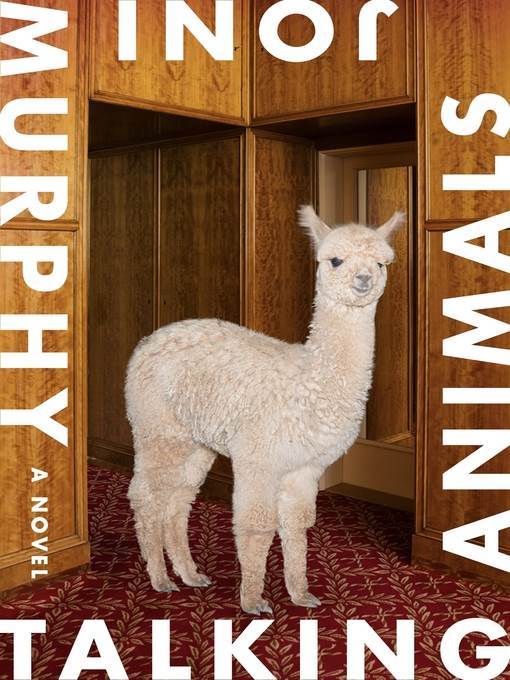
Talking Animals
A Novel
- اطلاعات
- نقد و بررسی
- دیدگاه کاربران
نقد و بررسی

June 1, 2020
Murphy offers a satirical fable set in an alternate world peopled by all species of animals. New York City is introduced as a "vessel for animals" in Murphy's first chapter, a purposely grandiose history of the city in which readers will assume animal references--"herds," "invasive species"--are metaphoric. They're not, or only in the sense that the book is one giant metaphor, a 21st-century combination of Animal Farm and Aesop's Fables. It's also a political thriller about an unwitting government bureaucrat uncovering corruption--think Robert Redford in his Three Days of the Condor period except he's a llama or alpaca. The alpaca would be Alfonzo, toiling in the basement of City Hall as second assistant to the nonexistent assistant to the nonexistent commissioner of records while also working on his Ph.D. Illicitly printing out his dissertation at work, he borrows office paper from his friend Mitchell, a llama who works on housing issues (a humorous tip of the hat to New York's Mitchell-Lama affordable housing program). Better at office politics than his friend, Mitchell nevertheless feels caught between the needs of the poor and homeless versus the demands of landlords and the mayor, whom he hates. Alfonzo's dissertation is rejected, in part because the scrap paper Mitchell has given him happens to have irrelevant facts and figures printed on the pre-used side. Meanwhile, right-wing radio is influencing land animals to blame sea animals "for every woe," and Alfonzo finds a publication in his bag from the resistance movement SERF, the Sea Equality Revolutionary Front, a cause Mitchell's lemur girlfriend, a barista, has been pushing. When Alfonzo learns his department is being closed, and the reason, he and Mitchell are spurred into action. Murphy packs a lot of issues--class, climate change immigration, vegetarianism, and more--into a familiar plot about malfeasance. She balances her poetic ruminations and dogmatic lecturing with a goofy relish for puns, from "The Five Burrows" of New York to the "freshly groomed" horse mayor to "Reading Rainboa" to radical "Bobby Seal." Weird yet engrossing and hard to forget.
COPYRIGHT(2020) Kirkus Reviews, ALL RIGHTS RESERVED.

June 8, 2020
In this bighearted if flawed eco-fiction satire, pun-loving alpaca Alfonzo Velloso Faca takes on corruption and climate change. The novel’s sweeping opening describes an alternate-reality New York City populated by a menagerie of talking animals, a hierarchical city arranged by “unwritten laws of class, order, family, genus, and species.” Alfonzo, the son of immigrant Bolivian camelids, toils in the city’s Department of Records. He is also nearing completion of a dissertation in mammalian studies “that would tease out the myth of empire from the unwashed raw wool of reality.” Rot is all around him, from the city’s venal equine mayor (the scion of an elite family), to the polluted, rising oceans and the troubling demonization of sea creatures (“They hate our legs and our free society,” claims a porcine city hall official). Alfonzo’s best friend, a llama named Mitchell, introduces him to the nonviolent Sea Equality Revolutionary Front (SERF) and embroils him in an effort to expose the mayor’s graft and bring down his antisea administration. The intrigue takes its time heating up and never fully comes to a boil, and speechifying abounds in the dialogue. Murphy has great fun animalizing the streets of N.Y.C. and writes beautiful paeans to the sea, but the gags, heady sociological riffs, and lyricism can’t quite sustain the novel.

July 1, 2020
The overture to Murphy's precisely imagined second novel, following Double Teenage (2016), encapsulates the long history of an island metropolis resembling New York, although this city is a vessel for animals in which a diverse, concentrated populace obsesses over the unwritten laws of class, order, family, genus, species. The star of Murphy's vivid and funny cautionary allegory, an appropriately provocative, twenty-first-century, urban variation on George Orwell's Animal Farm, is Alfonzo, a sweet, anxious, and sensitive alpaca struggling to complete his enormous, meandering dissertation about "the myth of empire," while working in the basement records department in City Hall. His confident, more worldly friend, Mitchell, a llama, works upstairs. Both are smitten with Pamella, a lemur barista and secret radical. As chaos escalates after a catastrophic hurricane and further ravages of climate change intensify, the corrupt racehorse mayor colludes with conniving developers, and a movement rises to fight land-animal supremacy and the vicious persecution of sea creatures. Murphy's astute perceptions social, political, and emotional; ingenious inventiveness, fluid empathy, and mischievous wit coalesce in an irresistible fable of ringing impact.(Reprinted with permission of Booklist, copyright 2020, American Library Association.)




دیدگاه کاربران